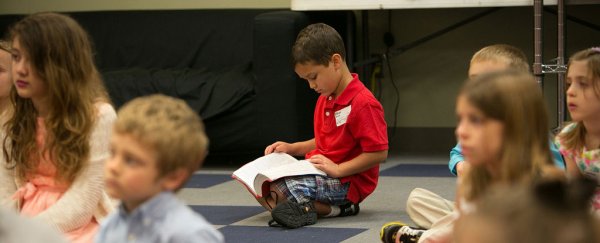Religious parents have lots of reasons for wanting to bring their kids up within their chosen faith, and one of those reasons will often be the desire to ensure that their child grows up to become a generous, fair-minded and altruistic individual.
But does it work? A new international study has examined the behaviour of children growing up in six countries and found that the opposite is in fact the case, with children from religious upbringings demonstrating significantly less altruism than their non-religious peers.
"Our findings contradict the common-sense and popular assumption that children from religious households are more altruistic and kind toward others," said Jean Decety, a professor in psychology and psychiatry at the University of Chicago. "In our study, kids from atheist and non-religious families were, in fact, more generous."
A team of developmental psychologists studied the behaviour of more than 1,100 children between the ages of five and 12 in six countries: Canada, China, Jordan, South Africa, Turkey and the US. What they were looking for was the children's tendency to share – a measure of their altruism and generosity – and also how likely they were to judge others or punish them for perceived bad behaviour.
To measure kids' sense of altruism, the researchers had the children play a game in which they had the ability to share stickers (if they chose to, that is). To gauge their moral sensitivity, the kids watched animations of characters that bumped one another, either by accident or not, and were asked to comment on what they saw and determine the level of punishment required if any.
In addition to the testing, the parents of the children filled out questionnaires detailing their religious practices and beliefs, with the families being categorised into three groups: Christian, Muslim, or non-religious. Other religious groups were also present, but not in statistically significant proportions for the purposes of the study.
What the researchers found is that the religious children were significantly less likely to share their stickers than the kids from non-religious backgrounds. This non-altruistic behaviour was also more pronounced in children who had been exposed to religion for a longer time, although all the kids in the study in general showed more inclination to share as they grew older.
The religious kids were also more likely to favour stronger punishments for the anti-social behaviour and interpersonal harm they witnessed in the animations – and were harsher in their judgment than non-religious children when it came to assessing the meanness of characters onscreen bumping into one another.
"Together, these results reveal the similarity across countries in how religion negatively influences children's altruism," said Decety. "They challenge the view that religiosity facilitates prosocial behaviour, and call into question whether religion is vital for moral development – suggesting the secularisation of moral discourse does not reduce human kindness. In fact, it does just the opposite."
The findings, which are published in Current Biology, may make people in some quarters reconsider some assumptions about the necessarily positive effects of religion on a person's moral development.
"This view is unfortunately so deeply embedded that individuals who are not religious can be considered morally suspect," said Decety. "In the United States, for instance, non-religious individuals have little chance to be elected to a high political office, and those who identify as agnostic and atheist are considered to be less trustworthy and more likely to be amoral or even immoral."
